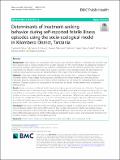Files in this item
Determinants of treatment-seeking behavior during self-reported febrile illness episodes using the socio-ecological model in Kilombero District, Tanzania
Item metadata
| dc.contributor.author | Mburu, Caroline | |
| dc.contributor.author | Bukachi, Salome A. | |
| dc.contributor.author | Shilabukha, Khamati | |
| dc.contributor.author | Tokpa, Kathrin H. | |
| dc.contributor.author | Ezekiel, Mangi | |
| dc.contributor.author | Fokou, Gilbert | |
| dc.contributor.author | Bonfoh, Bassirou | |
| dc.contributor.author | Kazwala, Rudovick | |
| dc.date.accessioned | 2022-07-11T09:30:16Z | |
| dc.date.available | 2022-07-11T09:30:16Z | |
| dc.date.issued | 2021-06-05 | |
| dc.identifier | 280400957 | |
| dc.identifier | ebecbe90-f254-478e-9672-b1986c1312ad | |
| dc.identifier | 85107382716 | |
| dc.identifier.citation | Mburu , C , Bukachi , S A , Shilabukha , K , Tokpa , K H , Ezekiel , M , Fokou , G , Bonfoh , B & Kazwala , R 2021 , ' Determinants of treatment-seeking behavior during self-reported febrile illness episodes using the socio-ecological model in Kilombero District, Tanzania ' , BMC Public Health , vol. 21 , 1075 . https://doi.org/10.1186/s12889-021-11027-w | en |
| dc.identifier.issn | 1471-2458 | |
| dc.identifier.other | ORCID: /0000-0002-8460-9213/work/115631008 | |
| dc.identifier.uri | https://hdl.handle.net/10023/25645 | |
| dc.description | The authors acknowledge support from the DELTAS Africa Initiative [Afrique One-ASPIRE /DEL-15-008]. Afrique One-ASPIRE is funded by a consortium of donor including the African Academy of Sciences (AAS) Alliance for Accelerating Excellence in Science in Africa (AESA), the New Partnership for Africa’s Development Planning and Coordinating (NEPAD) Agency, the Wellcome Trust [107753/A/15/Z] and the UK government. | en |
| dc.description.abstract | Background: Febrile diseases in Sub-Saharan Africa cause acute and chronic illness. Co-infections are common and these diseases have a complex etiology that includes zoonoses. For the implementation of appropriate treatment and control strategies, determinants of lay treatment-seeking behavior by the affected communities need to be understood. The objective of this study was to explore, using the socio-ecological model, the determinants of treatment-seeking actions among self-identified febrile illness cases in the Kilombero District of Tanzania. Methods: Thirty-nine in-depth interviews were conducted with 28 men and 11 women in three villages in Kilombero district. These villages were purposively selected due to malaria endemicity in the area, animal husbandry practices, and proximity to livestock-wildlife interaction, all risk factors for contracting febrile zoonotic infections. Thematic analysis was conducted on the interviews to identify the key determinants of treatmentseeking actions. Results: Study participants attributed febrile illnesses to malaria, typhoid and urinary tract infections. Treatmentseeking behavior was an iterative process, influenced by individual, socio-cultural, ecological and policy factors. Age, expendable income, previous history with a febrile illness, perceptions on disease severity, seasonal livelihood activities and access to timely healthcare were some of the determinants. Self-treatment with pharmaceutical drugs and herbs was usually the initial course of action. Formal healthcare was sought only when self-treatment failed and traditional healers were consulted after the perceived failure of conventional treatment. Delays in seeking appropriate health care and the consultation of medically unqualified individuals was very common. Conclusion: The results imply that treatment-seeking behavior is shaped by multiple factors across all levels of the socio-ecological model. Public policy efforts need to focus on facilitating prompt health care seeking through community education on the complicated etiology of febrile illnesses. Improved access to timely treatment and better differential diagnostics by health professionals are essential to ensure correct and appropriate treatment and to reduce reliance of patients on unqualified persons. | |
| dc.format.extent | 11 | |
| dc.format.extent | 587973 | |
| dc.language.iso | eng | |
| dc.relation.ispartof | BMC Public Health | en |
| dc.subject | Febrile illness | en |
| dc.subject | Treatment-seeking behavior | en |
| dc.subject | Agro pastoralists | en |
| dc.subject | Socio-ecological model | en |
| dc.subject | RA Public aspects of medicine | en |
| dc.subject | NDAS | en |
| dc.subject | SDG 3 - Good Health and Well-being | en |
| dc.subject.lcc | RA | en |
| dc.title | Determinants of treatment-seeking behavior during self-reported febrile illness episodes using the socio-ecological model in Kilombero District, Tanzania | en |
| dc.type | Journal article | en |
| dc.contributor.institution | University of St Andrews. Social Anthropology | en |
| dc.identifier.doi | https://doi.org/10.1186/s12889-021-11027-w | |
| dc.description.status | Peer reviewed | en |
This item appears in the following Collection(s)
Items in the St Andrews Research Repository are protected by copyright, with all rights reserved, unless otherwise indicated.

